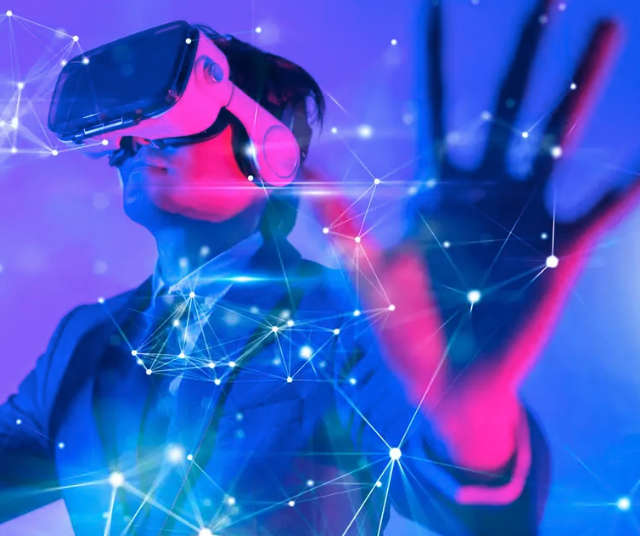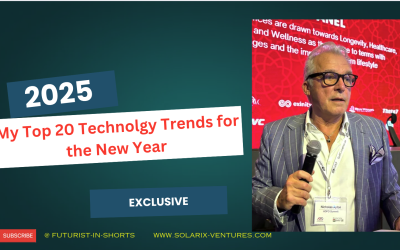
Is Technology Culture? Is Culture Technology?
Technology has taken over many aspects of our lives, especially in the connected first world economies, and whilst many that live in third world situations, the pervasive nature of tech has arrived in the form of satellite comms and mobile phones that has interrupted the natural rhythms of life, of evolution. The advent of StarLink and others will mean very soon every part of the planet will be connected to an inevitable technological future.
I’ve been working in technology for more than 45 years, learned computer science in the 1970’s and it is easy to forget the impact of technology on our lives, our behaviours and society at large. We take it for granted and have become accustomed to using technology often without thinking about its broader implications, how it has fundamentally changed us, it is worth reminding us of the Good, Bad and Ugly side of what technology. What can we expect in the years ahead as the rate of technological change accelerates, as Moore’s Law runs out of puff, superseded by new more pervasive and powerful technologies such as Quantum Computing, Artificial General Intelligence and Fusion, will move Culture in new directions.
Everything is impacted by technology that is so deeply embedded in our society, it can be argued it is also dictating our path as a civilisation — to prosperity or indeed rapid destruction. Whilst much of it (tech) is considered good, seen as progressive, we often overlook and ignore the darker side due to our reliance, our obsession and addiction to technology. We look past the harmful because of what tech brings in terms of convenience, lifestyle and immediate gratification benefits. Yet some of the outcomes, bi-products and consequences of tech is quite ugly, as yes you can have too much of a good thing.
But what is Culture exactly?
I am defining Culture as -common beliefs, norms, practises, behaviours, and artefacts that distinguish a group or community are referred to as Culture. Culture encompasses all forms of creative expression and human expression, including the arts, literature, music, fashion, gastronomy, and others. It also includes the social, political, and cultural structures that shape how people behave and see their place in the world, but it also has an historical context linked to previous generations and their journeys to advance and progress.
Culture isn’t fixed, rather, it evolves and adapts over time as a result of many causes and impacts, including globalisation, advances in technology, and ubiquitous communications. There is no doubt technology has had a significant impact (good effects) on Culture, but all is not well when digging deeper, the benefits sold to us are not benefits at all, cut deeply into Culture, leaving deep scars and open wounds. If technology hasn’t reached a culture, a geography then these items will be future impacts, acting as a warning.

The obvious Good.
Before we look at the broader implications let’s remind ourselves of some of the most notable impacts technology has made on Culture, before exploring other sides:
- Communication: technology (tech) has changed the way we communicate with one another, social media and instant messaging have made it possible for people to stay connected with friends and family from all over the world — replacing calls, emails as the preferred means. New forms of truncated communication, the use of emojis and memes, make it possible for people to connect with others who identify in the same group, shared interests as communities or part of a sub-culture.
- Access to Information: It has never been easier for people to access the vast amounts of data and information which is now at our fingertips. A consequence is a much better understanding of the world around us, but it has also led to the wide spread use of misinformation, manipulation and in some cases the re-writing history, alternate science and extreme beliefs sold and positioned as FACT. Although society seems to have lost touch with its primary instinct — gut feel, reading people and fact checking!
- Media Consumption: our attention span is shorter, as new generations arrive expecting to be entertained all the time, have instant access to everything. The way we consume media, using streaming services and on-demand content makes it possible for people to watch what they want, when they want. This has led to a decline in traditional forms of media, television and radio, and has also led to the creation of new channels: Podcasts, Clubhouse, TikTok and the concept of reality events — Reels and VLOGS as people seem compelled to broadcast an alternate view of themselves.
- Work and Business: the nature of work, how we work and do business has fundamentally changed — adding the additional impact of pandemic lock-downs — many societies were forced to adapt and work from home. Remote working/teleconferencing have become more common with e-commerce platfroms has made it possible for businesses to reach customers all over the world.
- Socialising and Relationships: the way in which we socialise and form relationships has also changed. These days business deals are done without ever meeting someone physically; regular contact with family and friends using Whats App and Signal, on social media Messaging LinkedIn and You Tube to reach new clients. Online dating and social media have made it easier for people to connect with others.
- Beliefs and Values: our beliefs and values have been impacted, and our priorities have changed where a ‘Like’ is desired over a physical smile, where the number of Views is seen as success. Unlimited access to information allows us to learn about different cultures and perspectives may contribute to more open-mindedness and acceptance of diversity, but it has also created barriers and amplified differences that are soon exploited.
- Creativity and Self-Expression: people can express themselves in new and creative ways. Social media, video editing, music production software and AI tools have made it easy for people to create and share their own content with a global audience. The emergence of ‘I’m far more interesting online’ and ‘look how fab my life is’ and ‘I have something to say’ —has become an obsession with millennials and Gen- X.
- Language and Communication: our use of language, how we communicate, we have instant dialogue, translation and voice to text AI has removed any barriers to starting a conversation. Texting and instant messaging have led to the use of shorthand such as emoticons and emojis, resulting in a dilution of communication skills that may have made everyone lazy, forgetful and possibly ruder?
- Gaming and Virtual Reality: people engage in new forms of entertainment, — video games and virtual reality, leading to full immersive experiences that is drawing in a new generation to spend more time is a digital world (MetaVerse) has led to the development of new subcultures and global communities who can play together e.g. Fortnite.
- Education: access to education systems offers anyone the opportunity to learn new skills, to become better. Online learning and MOOCs (Massive Open Online Courses) allows people to access education from anywhere in the world as we prepare for the next phase — Intelligence Amplification using implants and HBI downloads.
- Healthcare: patient diagnosis at the point of care and delivery has shifted. Telemedicine as ‘tele-health’ with new automated layers of triage, has made it possible for patients to receive medical advice and treatment remotely, and for doctors to access digital patient records from anywhere, during times of pandemic uncertainty, has improved access for many.
- Politics and Democracy: our politics and democracy will never be the same again. The influence of social media and the internet have made it possible for people to organise and mobilise political movements, and for politicians to connect with voters to spread their message. But social media has been complicit in allowing politicians to weaponise these platforms to mislead voters, and capture the political high ground and steal the electorate.
The obvious Bad
While it is true technology has had many positive impacts on Culture, it has also had some negative (bad effects) effects, these include:

- Disconnection from Reality: the increasing use of technology, spending more time on the Internet means less time interacting with the physical world with real people, leads to feelings isolation and being disconnected from reality. The arrival of the MetaVerse, online Gaming and digital worlds to visit merely amplifies the feeling of isolation, making some feel more inadequate, prompting increases substance use, self harm, depression, thoughts of suicide and inadequacy and digital dementia.
- Spread of Misinformation: the shere volume of information online, it is difficult to distinguish between accurate and inaccurate information, to filter the bias of the message, work out the degree of message manipulation behind it. This has led to the erosion of trust in traditional sources of information, examples of social media helping to manipulate disinformation as truths to incite riots, placing communities at war with each, and inciting hatred for commercial and political gain.
- Dependence on Technology: like a drug, people have become more dependent on technology not less. Their lives fall apart if they cannot get online or lose their phones — find it harder to complete tasks or function without it. This makes people feel vulnerable as dependency grows. Things will only get worse with AI as artificial systems predict human needs and desires and fill in the gaps, become indispensable, increasing dependence and making people more dumb, isolated and vulnerable.
- Decline in Privacy: it can be argued ‘privacy’ is already dead, the vast amount of personal information available online, bled by big companies and governments who do not adequately protect it. Information is gathered, exchanged and sold much without our consent places everyone on the back foot. Privacy is continually eroded as the concept of ‘self sovereign’ identity becomes a myth, as it suits governments, authorities and those in control to erode what privacy remains in the name of disclosure, national security and pandemics.
- Job Displacement: the increasing use of automation and AI entering the workplace will replace repetitive process jobs, although new ones will be created. A dramatic increase in the loss of jobs where skills and processes are repetitive can be expected, impacting as much as 70% of all jobs.
- Weaponisation by Government: the temptation to supress an entire people (country), to control and manipulate a population, to impose draconian rules, laws as surveillance is sold via technology as a benefit, an improvement to society — offering safety, ease of moving around, entertainment, freedom of speech and useful information, doing your bit for the economy. The reality is control is intensifying and authoritarianism is here.
Deeper Ugly
As we dig even deeper we find there is another few layers of ugliness, negative effects that will have far reaching implications for continued erosion and attack on Culture, a repeatable replication of convenient truths as governments want convenience, the people to do as they are told, and want to block free will of its citizens:
- Polarisation: it easy for people to find and connect with others who share similar beliefs, which can lead to the reinforcement of existing negative and unhelpful beliefs. This dialogue has been hijacked which can make it harder for people, groups and communities to understand and appreciate different perspectives, and can lead to increased polarisation and divisiveness within society. Social media has been accused of behavioural manipulation allowing the extreme left and right agendas to divide the people and incite social unrest.
- Increased Surveillance: will lead to complete authoritarianism, which is sweeping across the western world, as they point a finger towards other nations as the risk. A distraction strategy by governments and organisations who miss-sell free access to things provided we hand over more personal information as a necessary. What comes next will be the enforcement of healthcare biometrics and financial records. The surveillance healthcare app (for pandemics) will turn into mandatory healthcare and personal tracking, and the Central Bank Digital Currency (CBDC) that tracks and traces every unit of currency within a country, will allow government to control it, own it and move it. It will never be yours. Leading to a further loss of freedom, erosion of democracy and creation of new fear Cultures.
- Cyberbullying: it easy to communicate online anonymously has caused the rise of cyberbullying, more harmful than physical bullying. This has lead to an increase in suicides and depression amongst the young, severe mental health issues as people are attacked and reputation and lives destroyed online, as social media platforms sit back and watch, essentially supporting and complicit in the abuse, hate, slander and libel that leads to an overall feeling of worthlessness, anxiety and poor mental-health.
- Economic Inequality: your employer is watching you, monitoring your every move workplace, working out which jobs can be done by machines. This will lead to increased economic inequality and a widening wealth gap as large swathes of the population cannot find work — the Universal Basic Income solution that will contribute to the mass feelings of worthlessness, inequality and as history has shown will result in uprisings and civil war.
- Environmental Impact: the manufacturing, usage and disposal of electronic devices, especially smartphones, has a significant negative environmental impact. The mining of raw materials, energy consumption during production, and disposal of electronic waste can contribute to pollution and environmental damage. Data Centres that house the massive amounts of data being processed quadruples each few years creates a massive impact on green house gases. But tech is also used to sow disinformation, that goes against common sense and science to fool people the climate issue is not real. New technologies use materials that do not sit well with disposal and end of life — EV batteries is the elephant in this current room of misinformation, lies and untruths.
- Cultural Homogenisation: access to information and media from all over the world has led to an increase in understanding and appreciation of different cultures, but also the erosion of traditional cultures and the homogenisation of global Culture continues, has not been helpful to protecting societal values, ethics and underpinning democracy. The use case is the European Union that wants to create a single trading block running roughshod over national identities, leaving them devoid of self sovereignty and cultural identity.

What are we going to do about it?
Ok, having presented the Good, Bad and Ugly above — what are we, and can we do about it?
- Encourage Critical Thinking and Media Literacy: education programs to teach people how to critically evaluate the information they find online and to recognise misinformation. There are strong arguments social media and Tik Tok is engineered to make people dumb. Media literacy guides to help people understand the way media is created and distributed, to identify the different types of bias present in all sources of information.
- Self Sovereign Identity: the urgent need for all the people to withdraw their information, and permissions, and only agree to disclose it on their terms. New technologies (decentralised) puts people in control of their data (Web3), confirms ownership and sovereignty over their information, creations, assets and possessions. This will be essential to protect and secure the next evolution of Culture.
- Promote Responsible Use: the need to promote responsible use of technology and highlight the negative effects of excessive screen time and social media use, the intrusive nature of AI and how governments are using tech for surveillance, suppression and restricting freedoms. There is an urgent need for an updated Privacy Act written by the people for the people. New AI legislation that prevents systems from recording your life in every detail without your knowledge and permission.
- More Face-to-Face Communication: clear warnings about the healthcare concerns and impact of excessive use of online social media, digital worlds (Metaverse) outlining the evidential impact on productivity and mental health. More help for students to develop and maintain social skills to be able to build relationships with others in the real world.
- Encourage Diversity and Inclusivity: the regulation of tech companies and developers who build products and platforms to make sure they are inclusive, promote diversity, as evidenced by their code and neutral biases. Creating platforms and tools that are accessible to people with disabilities, and creating content that represents different cultures, ethnic groups and perspectives.
- Encourage Transparency and Privacy: aimed at governments and organisations to enforce transparency and disclose the ways in which they use personal information and adherance to implement stricter privacy laws and regulations will protect citizens personal information — show me, prove it! The pervasive nature of rogue systems and software requires a ‘Public Warning’ for example: how governments intend to use of facial recognition, DNA capture and other metrics without consent, and make sure governments do NOT deploy social scoring systems that will entirely destroy any Culture.
The next wave of Technology will be worse:
The next wave of Deep Tech and Frontier Technologies is likely to have a more profound impact on Culture than the previous tech waves, more pervasive, destructive and amazing (in the right hands). It is a scary thought.
Here are a few examples of how this might play out.
New Fuels and Energy Sources: solar has taken us so far and there are enough protons emanating from the sun to run our entire planet, net zero today, and move away from the climate destroying oil industry. Society must break the oil monopoly that thrives on a societal, business and cultural dependance on burning fossil fuels. The proceeds of which are used to put politicians in power and sell the lie to the people other better less harmful technologies don’t work. Imagine a world where we have free unlimited energy, where we get more out than we put in, free energy — for everyone, we are closer than you may think. These new technologies must not be hidden behind the curtain of misinformation.
Full Decentralisation: there is a world where everyone has control of their sovereignty, their data, information, personal assets and everything to do with their identity. Where people disclose, are rewarded for sharing their data directly, associated with their unique content, assets and creativity. A series of new file systems will re-invent the Internet which is kept dumb on purpose by government so they can intercept, listen in and gather and spy on the people. Imagine encoding your data that enables you to track and trace your data bio-metrically, and stop people using it, turn it off, call it back —you data linked to you as an individual, where you can detect unlawful use, block and prevent it! A world of self sovereignty will change the nature of commerce and not allow any third party to benefit from your creativity and assets, where a Culture of fairness, inclusion and prosperity may result.
Quantum Futures: the ability to finally get the most from AI, the arrival of brute force computing that will find the answers to humanities hard problems. How to cure diseases, understand how the world around us really works, develop new materials, propulsion systems and ways for humanity to exist off-world, to live a longer better life and progress to the next level of civilisation (Type II) encoded with a Culture that places humanity first, earth first.
Shape Shifting Materials: a revolution in manufacturing is approaching, as AI redefines the challenges and helps create new processes, techniques and materials. With 95% of the world’s production based on 100 year old manufacturing serial production thinking and processes. AI is about to change everything as all at once manufacturing does things entirely differently. A change that that will alienate entire countries, and sections of the labour force introducing new cultural dynamics as every town, city and country can make things, faster, cheaper and easier, enabling a withdrawal from globalisation, saving energy, slowing the transfer of germs and diseases, and removing there need to exploit other less fortunate countries.
Summary.
There is no doubt technology has helped humanity advance in so many ways, as a tool, find new cures, new opportunities, new jobs, making life easier, more convenient, but it easy to ignore the darker side and the mass market impacts on our diverse global Culture, which defines us as human. But technology advancements have also been held back so the incumbents can milk to societal dependencies on older ways of doing things, on legacy products and services cash cows.
Ponder this: isn’t the direction of technology in the hands of today’s leaders likely to enforce a single uniform approach too everything, forcing all Cultures to change and conform, where people are less able to communicate freely and work physically together, no longer have the necessary social skills to collaborate, work together — a dystopia future where 99.9% of the people are worker bees for those in control, or will it be self serving AI setting the objectives.
History has show us several times, humanity is not good at playing nicely in the playground together, to collectively, as a single race work on solving the bigger issues; where diversity and differences are a blessing and each provides essential component to the bigger picture solution, so that civilisation has a future, together so that one party, country, dictator and sets of beliefs doesn’t ruin it for all of us.
Author. Nick Ayton is Futurist, technologist, Writer and Speaker.
@NickAyton



